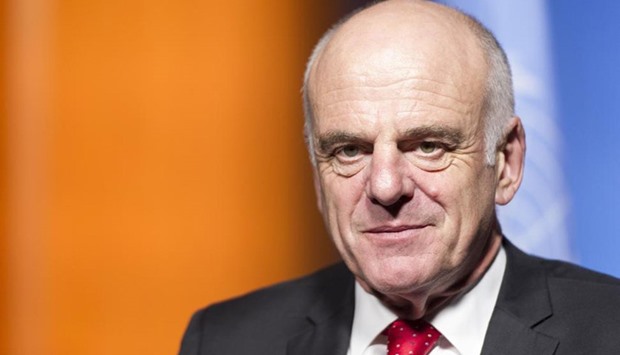In less than a month’s time the World Health Organisation will appoint a new leader on whom we will depend for the health security of our planet and its 7bn people. The election of the next director-general on May 23 is vital not only for protection against deadly diseases such as Ebola, Zika and pandemic flu but also for the future of the troubled UN body itself.
There are three remaining candidates in the race - and the strongest by far is Dr David Nabarro, who has a long history of working in global public health, on the front line and at the top table, both nationally and internationally.
As a former health minister myself, I know this is a critical moment for the WHO. Its response to the 2014 Ebola outbreak in West Africa has been widely criticised. It is in desperate need of reform to make the institution stronger and fit for purpose as co-ordinator of the world’s defences against infectious disease epidemics as well as champion of measures to tackle malnutrition and chronic conditions caused by changing lifestyles.
Dr Nabarro is the only candidate with a proven record of running an international response to a disease outbreak. He led the UN response to bolster the WHO in the dark days of 2014 when it was failing to contain the Ebola outbreak. As chair of the advisory committee, set up by the WHO’s outgoing director-general Margaret Chan, in the wake of the debacle, he pushed through reforms, including the establishment of a new health emergencies programme.
His plan to shift the WHO’s culture from doing its own small projects to catalysing action through partnerships, spreading good practice and encouraging political action, is clearly the right one. The organisation lacks the clout to effect change on its own. It must, as Dr Nabarro has said, act more strategically, especially when it comes to tackling the chronic conditions of diabetes, heart disease, and cancer spread by modern, fast-paced lifestyles, particularly in but certainly not limited to the developed world.
The new director-general will face serious financial challenges too. There is an increasing reliance on voluntary contributions that are earmarked for specific projects. The proportion of the WHO budget made up of these voluntary sums continues to increase, now at almost 80%. This is a precarious situation that must be put on a more secure footing with donors being confident that their investments are delivering results and represent value for money.
In the face of these challenges the WHO will only secure its own future, and be in a position to protect all of ours, if it wins back trust, rebuilds its credibility and proves its effectiveness and value for money. Of the three candidates, Dr Nabarro is the one with the experience, the drive and the stature to succeed in that aim.
Dr Nabarro has made an exemplary commitment to transparency during the campaign to lead the WHO. For example, he was the first candidate to release his campaign expenses.
Transparency and accountability will be crucial in pushing forward WHO reform, and member states are absolutely right to expect that focus.
It is therefore disappointing that some have the misapprehension that “by convention the five permanent members of the UN Security Council (of which Britain is one) do not supply the heads of such agencies” - in fact there have been many examples of this.
In the past the job has always been decided between governments trading political alliances. This time, with the WHO’s reputation at an all-time low, it is too important to be left to political horse trading. It needs a global candidate, with global experience, to serve the interests of people from across the world.
Many highly respected global health experts, including England’s Chief Medical Officer, Dame Sally Davies, believe Dr Nabarro is simply the best person for the job. And I could not agree more.

Dr David Nabarro
